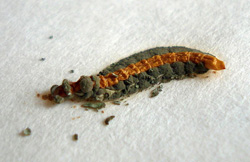Bioagents control soil-dwelling pests
Around 70 % of insect pests spend at least part of their lives underground, making them particularly difficult to control. This fact together with recent legislation requiring farmers to stop using several common pesticides has resulted in a need for new pest control strategies. The EU-funded INBIOSOIL (Innovative biological products for soil pest control) project addressed this challenge through biological pest control. Its aim was to develop and test new formulations of entomopathogenic fungi, nematodes and semiochemicals that target soil-dwelling insect pests. Scientists tested several different fungal isolates, and selected two for further testing specific formulations in an 'attract and kill' strategy, due to their effectiveness against specific pests. They also tested 20 different semiochemicals for 'stress and kill' pest control strategies. Several new protocols were developed during the project lifetime, which focused in particular on the direct and indirect side-effects on beneficial (non-pest) insects. Other tests were developed to assess the effects of these formulations in field trials. Two different formulations were tested: one against wireworms in potato fields, and another that combated western corn rootworm larvae. Researchers developed a novel capsule type based on biopolymers and sustainable raw materials combined with specific isolates of entomopathogenic fungus, now registered under the brand name ATTRACAP®. When applied to the soil, these capsules produce carbon dioxide, a cue used by most soil-dwelling larval stages to locate their host-plant roots. When coming into contact with these capsules, fungal spores attach to the cuticle of the larvae and kill them by invading the insect's body. The capsule efficiently controls wireworms in potatoes, which causes severe damage to tubers in autumn, entailing serious economic losses for farmers. Specific capsule types have also been designed for other herbivorous pest species, such as western corn rootworm, black vine weevil and fungus gnat larvae. INBIOSOIL also analysed the socioeconomic impact of using biological control agents and demonstrated that they are a viable alternative to conventional pesticides. Risk assessment data generated by the project will speed up the registration of biological control agents and help policymakers and stakeholders in decision-making processes based on the safety of these environmentally friendly agents and strategies.
Keywords
Pest control, INBIOSOIL, entomopathogenic, semiochemicals, biological control



